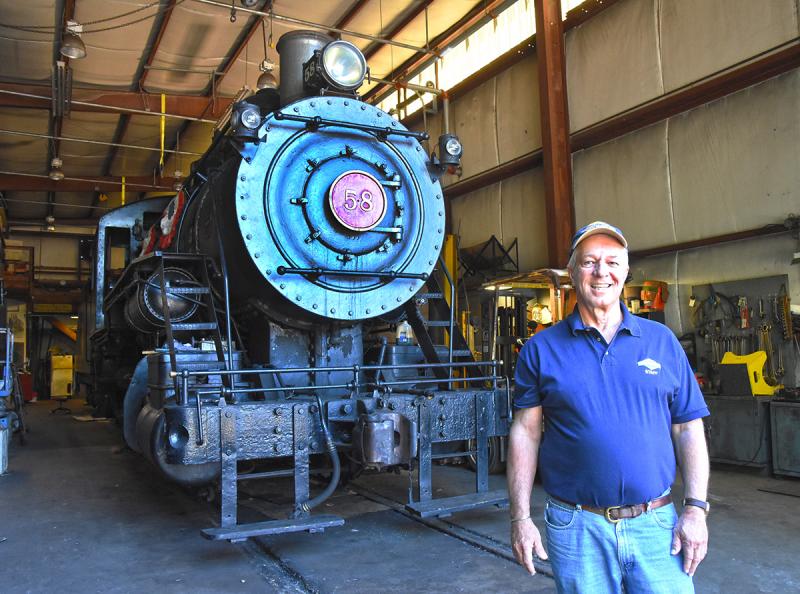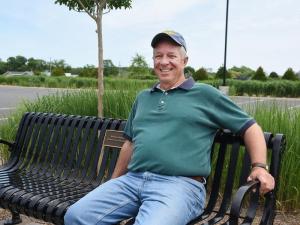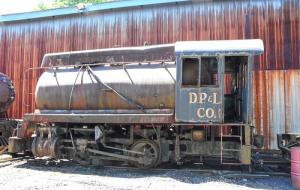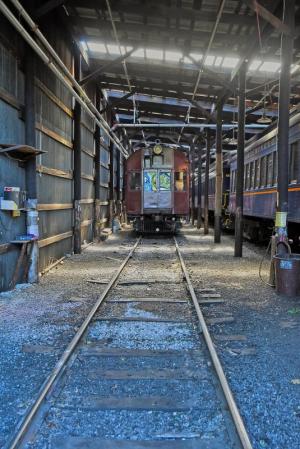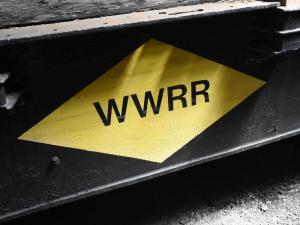David Ludlow: The man behind state’s heritage railroad
If there’s someone who knows more about Delaware’s railroads than David Ludlow, good luck finding them.
For the last 30 years, Ludlow has been a jack-of-all-trades for the Wilmington & Western Railroad. Whether out replacing track or repairing a bridge, rubbing elbows with donors or working with the state, or selling tickets and working with volunteers, Ludlow has done it all. “I’m an in-the-truck kind of guy,” he said through a smile in a booming voice. “But I’m also raising the funds for any kinds of big improvements.”
Ludlow recently retired as executive director of the railroad, although retirement is a relative term, as he still spends many days a week at the railroad helping with transition and the search for his replacement.
Railroading is in his blood. Both his grandfathers worked in the industry – his maternal grandfather in the purchasing department of the Louisville & Nashville Railroad, and his paternal grandfather as a steam locomotive engineer for 50 years on the Illinois Central. Ludlow still has the gold pass his grandfather received for his five decades of service to the railroad.
“You could basically show this pass to any other railroad system in the country, and they gave you free passage to go wherever you needed to go,” he said. “It’s a big old piece of gold metal. It’s heavy.”
Before taking the reins at Wilmington & Western, Ludlow worked as a volunteer working on track maintenance. “I thought I was making a difference,” he said. “Every time I put a tie in, we were better off than we were, and there’s 35,000 of them on the track.”
Wilmington & Western Railroad is Delaware’s only heritage tourist railroad. The nonprofit organization maintains 10 miles of former Baltimore & Ohio track from west of downtown Wilmington to the Delaware state line through the newest state park, Auburn Valley. The organization runs about 400 train rides per year, some with modern diesel locomotives and others with iconic steam locomotives. About 37,000 people walk through the door each year.
The railroad is typically open Friday through Sunday, often offering family-friendly themed events with Santa Claus, the Easter Bunny, princesses and superheroes. They also offer Brews on Board with local breweries and special-event dinners on the rails. Cabooses and parlor cars are also available for birthday parties, family reunions and other events.
The railroad wasn’t always as successful as it is today; it was struggling in Ludlow’s earliest days. There was turnover, and the organization was in need of strong leadership. “I agreed I would work for them for a year without any compensation,” he said. “I said if I couldn’t make a difference and make something happen, then they weren’t going to pay me a thing.”
He started in January, and by August, the organization was on much more solid ground, to the point where Ludlow could be paid, and they could hire other needed employees.
Ludlow was fortunate that he could work without pay for most of his first year. He owned a small landscaping company and could take time away. “It could survive on its own. I didn’t need to be there every minute,” he said.
Early on, Ludlow spent a lot of time working to revitalize the railroad. “It could’ve been 65 or 75 hours a week,” he said. “I tried to do everything. I thought, if I just come down to the railroad some more and spend more time there I could make it even better.”
Ludlow grew up in north Wilmington and attended the University of Delaware, but his family is originally from the Midwest. His parents met in Louisville, but his father got a job as a chemical engineer for the DuPont Company, so they moved to Wilmington.
He now spends a lot of time in the Lewes area with his significant other, Sally Boswell. He’s become heavily involved in the Lewes Junction Railroad & Bridge Association, which plans to bring a locomotive, passenger car and caboose to Lewes and display them on a small piece of railroad track preserved between the Lewes Public Library and the Lewes History Museum.
Among other plans, the group also wants to preserve the 103-year-old hand-cranked railroad swing bridge in the Lewes-Rehoboth Canal, which was determined to be unsafe in 2017, leading to the removal of the railroad tracks from Lewes to Cool Spring. Once the tracks were removed, the railbed was converted to the Lewes-to-Georgetown Trail, leaving the 210 feet of track near the library and the bridge in the canal as the last evidence of a railroad in Lewes.
Preservation of the bridge is one of the main reasons Ludlow got involved with the group. “I’ve worked with DelDOT a lot,” he said, noting the Wilmington & Western Railroad maintains 20 bridges and 13 road crossings. He said his contacts with state transportation officials could benefit the group.
He said the swing bridge is one of only two of its kind left in the country. If or when the bridge is removed from the canal, he said, he’d like to ensure it is preserved in some way and used to tell the story of Lewes’ railroad history.
Ludlow also plans to donate Wilmington & Western Railroad’s fireless locomotive to the group for display. The Delmarva Power & Light 1 sits in the organization’s maintenance yard among other aging, unused pieces of train equipment. “Delmarva Power & Light gave it to us, and we’ve kept it in some stage of restoration,” he said. “But I thought it would be ideal for down here in Lewes.”
He foresees the Lewes railroad project as a huge success. “Lewes and Rehoboth have some of the best bike trails on the Eastern Seaboard,” he said. “We’re going to be able to get the visitors who ride along with their children who can come up and look at these railroad machines. Part of my interest is to preserve, educate and interpret for the benefit of the public.”
To learn more about the Wilmington & Western Railroad, go to www.wwrr.com.
Nick Roth is the news editor. He has been with the Cape Gazette since 2012, previously covering town beats in Milton and Lewes. In addition to serving on the editorial board and handling page layout, Nick is responsible for the weekly Delaware History in Photographs feature and enjoys writing stories about the Cape Region’s history. Prior to the Cape Gazette, Nick worked for the Delmarva Media Group, including the Delaware Wave, Delaware Coast Press and Salisbury Daily Times. He also contributed to The News Journal. Originally from Boyertown, Pa., Nick attended Shippensburg University in central Pennsylvania, graduating in 2007 with a bachelor’s degree in journalism. He’s won several MDDC awards during his career for both writing and photography. In his free time, he enjoys golfing, going to the beach with his family and cheering for Philadelphia sports teams.














